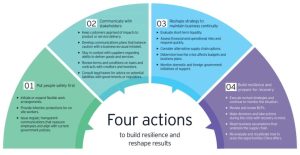Why Small Business Loans Are Not Approved

Small business loans are often refused for various reasons. Traditional borrowers have used stricter decision-making factors and loan credit restrictions to reduce risks since the beginning. Federal Reserve Banks in New York, Atlanta, Cleveland and Philadelphia conducted investigations. According to the survey, only 50% of small enterprises applying for financing in the first half of 2014 received funds.
The simplest way to prevent small business loans from being rejected is to grasp the risk signals that borrowers often see. There is no doubt that some banks will be more detailed than others. Generally, the bank is obliged to send you a notice in accordance with the law outlining the reasons why your loan application was rejected.
The following are the main reasons for the rejection of small business loans and how you can avoid this decline:
The credit score of small business loans is low.
One of the most common reasons for the rejection of commercial loans is that the company’s credit rating is lower than the borrower’s preference. Your financial records will be used to calculate your business credit score. Borrowers use it to decide whether a company can repay its debts before approving a commercial loan application.
Enterprises that have not defaulted on loans are less risky to borrowers, so they are likely to obtain very competitive interest rates. On the other hand, enterprises that have defaulted or repeatedly failed to apply for credit loans face more difficulties in obtaining financing. When applying for SME loans, your credit score will be considered no matter how long your business has been operating. If you can’t manage your credit, how much can you rely on when repaying commercial loans?
Your career is new.
Commercial lenders usually set the minimum business hours. It can range from six months to more than a year. If you are looking for capital for a startup or starting from scratch, you may not be able to meet these requirements. If your company is newly established, you will not have enough business credit records to obtain small business loans. Please note that suppliers do not always automatically report payments to commercial credit institutions. When opening an account with a new supplier or vendor, payments must be reported so that the company can create a credit record.
Similarly, even if there are sufficient financial records and meet the minimum business time requirements, loan applications may be rejected due to lack of business experience.
There is no doubt that even if you haven’t done business for a long time, you will have a very successful business and stable financial situation. However, the minimum working time requirement depends on the borrower and the type of financing, so you must consider the option before applying. If you have not enough business experience and are refused a loan, consider asking for a lower loan. Or consider postponing the application and continue to guide the company.
You don’t want enough money
Contrary to the general view, the more money you ask for, the more likely you are to get a bank loan. Because the service cost of small loans(less than $100000) is not valuable to banks, small commercial loans cannot be obtained from large banks generally.
Review financial data and business strategies to avoid underestimating the amount of capital required. You can reapply and ask for a higher amount. Look for other sources of financing, such as micro loans or invoice based financing options. If you don’t need more money than you’ve asked for, you can offer a small loan. If you need capital, but do not need big money, you can consider alternatives to loans, such as small business credit limits.
You have no collateral
Many borrowers also require borrowers to mortgage valuable commercial assets as collateral to reduce risk. In the event of the borrower’s default, the borrower can take possession of the assets and try to recover the outstanding loan balance. Therefore, the value of the loan collateral should be sufficient to cover the total outstanding loans. Therefore, if your company is young and does not have any assets as security, or your assets have been pledged, your loan application may be rejected.
You can overcome this obstacle by choosing lenders who provide unauthorized commercial loans. Many loan substitutes can also provide funds without traditional guarantees. On the other hand, unsecured loans bring higher risks to borrowers. So they always have higher interest rates and fees.
Cash flow limit
When deciding whether to approve small business loans, the borrower should first consider the cash flow. They want to know if you have enough cash flow to pay your business expenses, repay the loan, and leave some extra cash for yourself. If your cash flow is unstable or you often experience seasonal recession, this may be a warning signal.
The borrower may worry that if the financial information shows that the cash flow is not good or fluctuates, the history of the cash flow may indicate future problems. Although this is not always possible, borrowers prefer stable commercial cash flow. If multiple services or products are provided, all revenue sources of the company and these sales historical trends will be displayed. Unsecured commercial loans are a good choice. If you need money immediately, it is usually easier to get it from other borrowers.
If the cash flow is poor and the loan application is rejected, the cash handling capacity may need to be considered. Bad cash flow is an important factor of enterprise failure. Use accounting software to simplify cash flow forecasting and reporting, and then check cash flow once a week for updates.
Your business is dangerous
If you work in a field with a high failure rate, even a strong career plan may be insufficient. For example, because of the high failure rate and potential unstable income, lenders generally believe that restaurants are more risky than other business types. Therefore, it is often difficult for specific industries, such as catering, construction companies, agricultural enterprises, gambling and other service industries, to obtain bank loan approval.
More difficult or expensive regulations in one industry may affect other industries. In other words, this further increases the bank’s risk taking obligations. Therefore, banks are often reluctant to turn too much to the industry or tighten their qualification standards to take risks, making it more difficult for most business owners to obtain such risks.
although you can’t change your industry, you can find a loan institution that focuses on the industry or shop in a reputable market where you can compare your choices.
Many alternative lending institutions target high-risk industries and provide financing options more suitable for these industries. However, these lenders may require collateral or pay higher interest rates and costs to compensate for increased risk.
One of the worst feelings is that commercial loan applications are rejected when funds are needed. But remember, it’s not personal to try again. But once you overcome your initial worries, this may be the time for the next class.
Don’t let these obstacles prevent you from successfully expanding your business.








